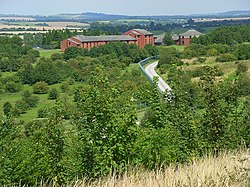Defence CBRN Centre
| Defence CBRN Centre Winterbourne Gunner |
|
|---|---|
| Near Winterbourne Gunner, Wiltshire in England | |

Defence CBRN Centre from Figsbury Ring
|
|
|
Shown within Wiltshire
|
|
| Coordinates | 51°06′43″N 001°44′16″W / 51.11194°N 1.73778°WCoordinates: 51°06′43″N 001°44′16″W / 51.11194°N 1.73778°W |
| Type | Defence CBRN Centre |
| Site information | |
| Owner | Ministry of Defence |
| Operator | Royal Air Force |
| Site history | |
| Built | 1917 |
| In use | 1917-Present |
The Defence CBRN Centre is a UK government facility at Winterbourne Gunner in Wiltshire, south of Porton Down and about 4 miles (6 km) northeast of Salisbury. It is a tri-service location, with the RAF being the lead service. It is responsible for all training issues relating to CBRN (chemical, biological, radiological and nuclear events) warfare for the UK armed forces.
It is also the home of the National Ambulance Resilience Unit's Training & Education Centre which, among other things, is responsible for training the NHS ambulance service's Hazardous Area Response Teams (HART). The centre was the home of the Police National CBRN Centre until it moved to NPIA facilities at Ryton, Warwickshire.
The site was established as an element of the Porton Down research facility in 1917. Known as Porton South Camp it served as a Trench Mortar experimental site.
Reducing in scale immediately following the cessation of hostilities in 1918, research into chemical weapons and defence recommenced in 1921, with South Camp becoming the Chemical Warfare School in 1926. In 1931 the site became part of the Small Arms School as the Anti-Gas Wing. It would later become an independent entity, in 1939, as the Army Gas School, later Army School of Chemical Warfare.
Until 1947 the establishment was operated purely by the Army, becoming a joint Army and Royal Air Force establishment at this point. The emergence of a nuclear weapons threat led to the inclusion of radiological defence into the portfolio. In 1964 the biological threat was included into the operation of the centre, becoming the Defence Nuclear, Biological and Chemical School.
...
Wikipedia


